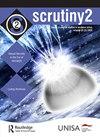Chaotic Homecomings in Prodigal Daughters edited by Lauretta Ngcobo, Always Another Country by Sisonke Msimang, and What We Lose by Zinzi Clemmons
IF 0.1
0 LITERATURE
Scrutiny2-Issues in English Studies in Southern Africa
Pub Date : 2019-01-02
DOI:10.1080/18125441.2019.1651385
引用次数: 2
Abstract
ABSTRACT The article discusses three contemporary works about and by first- and second-generation South African exiles. In Lauretta Ngcobo's collection of memoirs, Prodigal Daughters: Stories of South African Women in Exile (Scottsville: University of KwaZulu-Natal Press, 2012), 17 South African women present their personal accounts of political exile. In Sisonke Msimang's Always Another Country: A Memoir of Exile and Home (Johannesburg: Jonathan Ball, 2017), she writes about her exile childhood in Zambia, Kenya, Canada, and the United States, and her return to South Africa in the 1990s. Finally, Zinzi Clemmons's experimentalist debut novel, in the form of a grief memoir, What We Lose (New York: Viking, 2017), features a protagonist who, like the author, is a young American woman, the daughter of a South African mother and an African American father. All three works engage with the South African exile's experience of unhoming and conflicted homecoming, and, importantly, with what home has come to signify for second-generation exiles. Focusing on the central exilic motifs of home and homecoming, the article shows how any essentialist or foundational notion of “home” is complicated by the experience of exile, especially for children of exile. Through an analysis of memoir and fictional memoir, the article argues that chaos complexity theory, with its principle of generative disorder and trajectories that are nonlinear, multidirectional, irreversible, unforeseen, unpredictable, and unstoppable, might also provide a useful paradigm for understanding the experiences and approaching the writings of those whose lives have been shaped in the wake of their parents’ exile.Lauretta Ngcobo编辑的《浪子女儿的混乱回家》、Sisonke Msimang编辑的《永远是另一个国家》和Zinzi Clemmons编辑的《我们失去了什么》
本文讨论了当代南非第一代和第二代流亡者的三部作品。在Lauretta Ngcobo的回忆录合集《浪子:南非流亡女性的故事》(Scottsville:夸祖鲁-纳塔尔大学出版社,2012)中,17位南非女性讲述了她们在政治流亡中的个人经历。在Sisonke Msimang的《永远是另一个国家:流亡与家园回忆录》(约翰内斯堡:Jonathan Ball出版社,2017)中,她讲述了她在赞比亚、肯尼亚、加拿大和美国的流亡童年,以及她在20世纪90年代回到南非的经历。最后,吉娜·克莱蒙斯的实验主义处女作,以悲伤回忆录的形式出现,《我们失去了什么》(纽约:维京出版社,2017),主角和作者一样,是一位年轻的美国女性,母亲是南非人,父亲是非洲裔美国人。这三部作品都与这位南非流亡者的背井离乡和冲突的归乡经历有关,更重要的是,对于第二代流亡者来说,家意味着什么。这篇文章聚焦于家庭和回归的核心主题,展示了任何关于“家”的本质主义或基本概念是如何因流亡经历而变得复杂的,尤其是对流亡儿童而言。通过对回忆录和虚构回忆录的分析,本文认为混沌复杂性理论及其生成无序的原理和轨迹是非线性的、多向的、不可逆的、不可预见的、不可预测的和不可阻挡的,也可能为理解那些在父母流亡后生活被塑造的人的经历和接近他们的作品提供一个有用的范式。
本文章由计算机程序翻译,如有差异,请以英文原文为准。
求助全文
约1分钟内获得全文
求助全文
来源期刊
CiteScore
0.50
自引率
0.00%
发文量
10
期刊介绍:
scrutiny2 is a double blind peer-reviewed journal that publishes original manuscripts on theoretical and practical concerns in English literary studies in southern Africa, particularly tertiary education. Uniquely southern African approaches to southern African concerns are sought, although manuscripts of a more general nature will be considered. The journal is aimed at an audience of specialists in English literary studies. While the dominant form of manuscripts published will be the scholarly article, the journal will also publish poetry, as well as other forms of writing such as the essay, review essay, conference report and polemical position piece. This journal is accredited with the South African Department of Higher Education and Training.

 求助内容:
求助内容: 应助结果提醒方式:
应助结果提醒方式:


